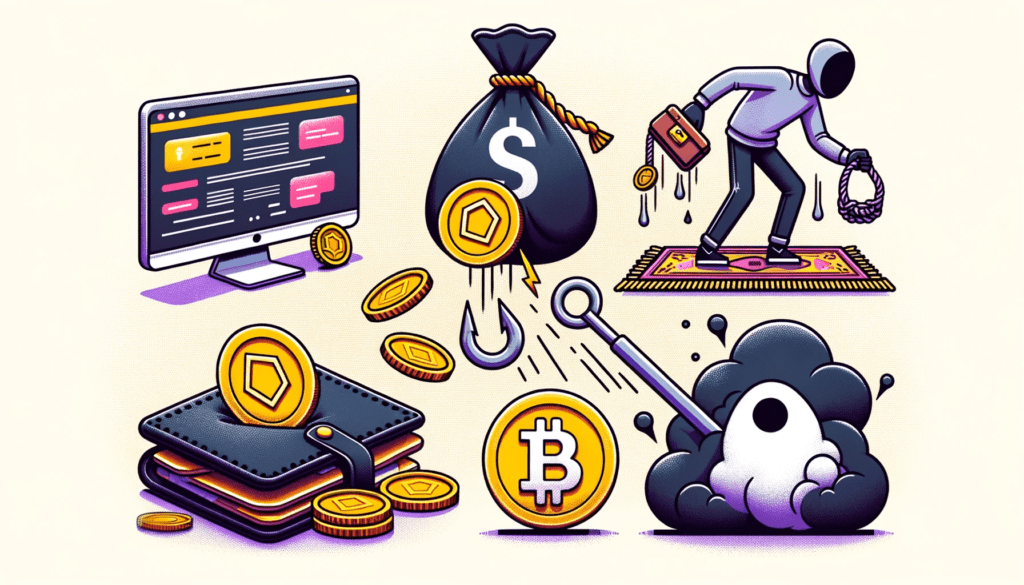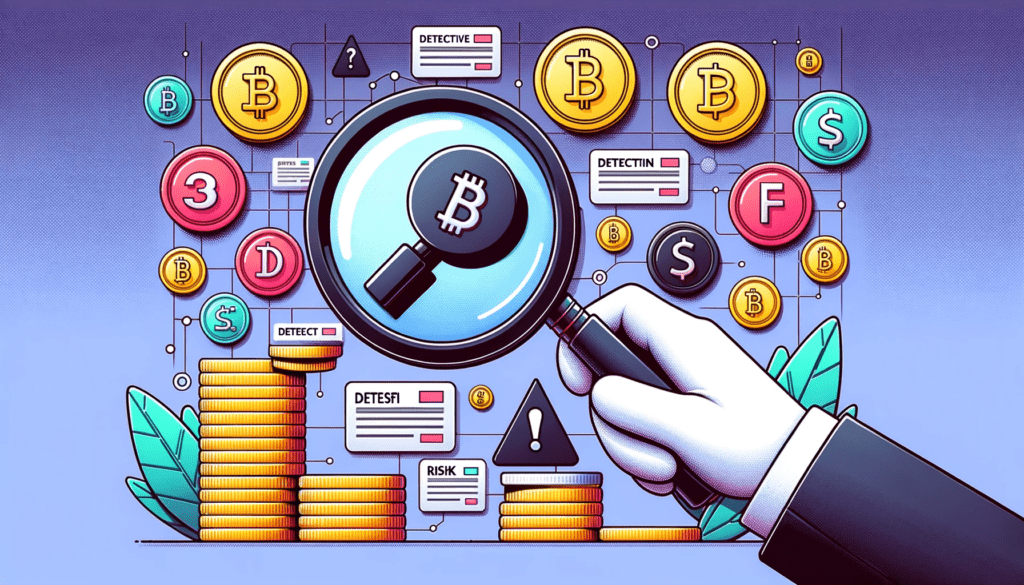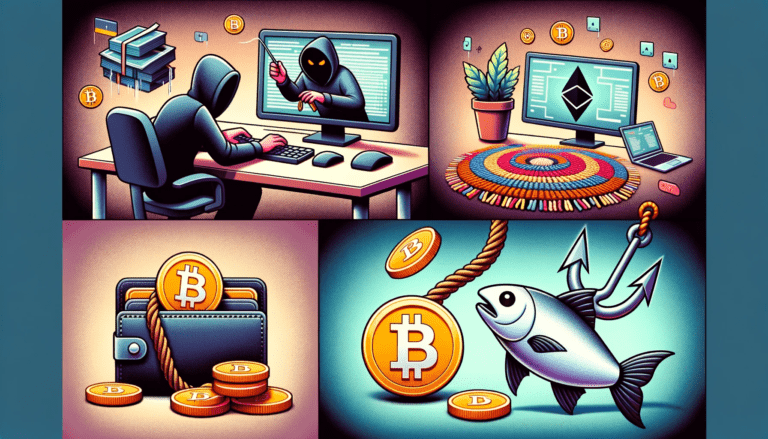Understanding DeFi Wallets
With an unexpected rise in popularity, decentralized finance, or DeFi, has resulted in a flood of innovative products in the financial sector. DeFi wallets, playing the central role, allow investors to store and manage their crypto assets. The ethos behind these wallets lies in handing control to the end-user and eliminating any intermediates. They conduct transactions directly on the blockchain, ensuring optimal transparency and enabling users to operate outside traditional financial systems.

Yet, modern solutions often come with new challenges. Code exploits and DeFi wallet scams have become prevalent, with ill-minded individuals looking to exploit any apparent weaknesses. Code exploits involve taking advantage of vulnerabilities found in the wallet's coding structure, while DeFi wallet scams typically aim to trick users into revealing sensitive information. This evolving financial landscape certainly necessitates keen insight, strengthened security protocols, and prevention measures to ensure safer transactions and overall robust DeFi ecosystem.
Definition and functionality of DeFi wallets.
Decentralized Finance (DeFi) wallets, born out of blockchain technology, essentially serve as digital safehouses where private and public keys are stored. Unlike traditional banks, these wallets facilitate seamless transactions and investments within the rapidly expanding DeFi ecosystem. They play a pivotal role in executing autonomous, transparent, and borderless financial operations. By utilizing smart contracts that automate validations and verifications, they promise higher degrees of transparency and trustworthiness in a space often marred by mistrust and ambiguity.
However, the DeFi landscape is not without its pitfalls. As the technology is still in its infancy, it has given rise to various scams, such as rug pull schemes and phishing attacks.
Differences between hardware and software wallets.
Hardware wallets are physical devices that securely store users' private keys offline. These 'cold storage' options add an extra layer of protection as they are immune to common online threats such as malware and wallet dusting attacks. They are ideals for storing large amounts of crypto assets, primarily because they provide control and security over your private keys instead of leaving them in the hands of third-party services. However, the downside is they can be physically misplaced, stolen, or damaged, which can result in the irreversible loss of the stored assets.
On the other hand, software wallets are applications that store your crypto assets digitally on devices like a computer or a smartphone. These 'hot wallets' are accessible from anywhere as long as an Internet connection is available, providing an ease of use factor that hardware wallets often cannot match. However, being constantly online makes them vulnerable to hacking attempts, malware, and tends to become a prominent target for wallet dusting attacks. The use of scam detection tools is often advised when using software wallets to monitor and prevent any illicit activities. Users should also prioritize software wallets that place a high emphasis on security, notwithstanding the intended ease of transaction.
Common Types of DeFi Wallet Scams
One of the prevailing issues that plague the DeFi communities is the high susceptibility to various scams. Notable among them is the menacing rug pull scam, wherein developers abandon a project after raising substantial funds, leaving investors high and dry. These scams spike during bullish market trends, preying on users' FOMO. They underscore the need for secure DeFi platforms where such fraudulent activities can be curtailed.
Among other common scams are phishing scams and wallet dusting. In a phishing scam, attackers typically trick users into revealing sensitive information, such as wallet keys, leading to a loss of funds. On the other hand, wallet dusting involves sending a small amount of tokens to wallets, which, when moved, reveal transactional behaviors that can be exploited. Both scams serve as a reminder of why safe crypto practices, like keeping wallet keys confidential and exercising caution before engaging in transactions, are crucial for DeFi users.

Exploits and Vulnerabilities
The rise of decentralized finance (DeFi) has ushered in a new era of financial possibilities. However, with this growth also comes the growth of potential exploits and vulnerabilities in DeFi wallets. Unforeseen loopholes in the coding or security management can turn into ample opportunities for hackers, leading to devastating consequences for unsuspecting DeFi wallet owners. These breaches can range from minor ones affecting individuals to massive ones that shake entire networks and cost millions of dollars.
Performing a comprehensive risk assessment in DeFi is crucial for every investor due to these potential exploits and vulnerabilities. It helps in the identification of potential vulnerabilities before they can be exploited. Furthermore, being vigilant about unusual activities and using safer practices can reduce the chances of being victimized by scams. However, it's important to note that legal recourse for scam victims might be limited due to the decentralized nature of DeFi platforms. As such, individuals should be extremely cautious when dealing with DeFi assets to prevent any untoward incidents caused by DeFi wallet scams.
Rug Pulls
Rug pulls are a sketchy subset of DeFi wallet scams, attracting investors to a project with promises of high returns, only to vanish with their funds. The name comes from the analogy of pulling the rug from under one's feet. As of late, this deceitful strategy has led to significant financial loss. As per recent Financial Loss Statistics, conservative estimates put investor losses from rug pulls well into the multi-million-dollar range. Notably, these figures underscore the urgency of investing prudently and vigilantly in DeFi projects.
To counter these vile incidents, Asset Recovery Services have come to the fore. These services specialize in assisting victims of DeFi wallet scams such as rug pulls. They employ a suite of strategies and tactics aimed at tracing, reclaiming, and possibly returning stolen assets. However, while these services can provide some hope for victims of rug pulls, it's vital to remember that prevention should always be the first line of defense in the world of decentralized finance.
Phishing Scams
Phishing scams have become a significant part of the DeFi scam trends. Fraudsters employ sophisticated techniques to deceive unsuspecting users, often by posing as legitimate DeFi platforms or wallet providers. They create fake websites and apps, mimicking the look and feel of a genuine DeFi platform, intending to trick users into revealing their sensitive information such as private keys or wallet addresses. Once this sensitive data is handed over, the attacker gains unauthorized access to the victim's wallet, leading to asset theft.
Considering the increasing number of incidents, DeFi regulation becomes crucial to mitigate such scams. Regulatory entities can enforce stringent measures to authenticate DeFi platforms and wallets, making it difficult for fraudsters to create fake counterparts. Moreover, these entities can also educate users about the signs of phishing scams, such as an unexpected request for sensitive information or links from untrusted sources. Despite these measures, users need to be cautious and double-check any information before interacting with DeFi platforms or wallets. The crux is to remember that the digital world of DeFi, like its traditional counterpart, is not immune to scams.
Wallet Dusting
"Wallet Dusting" is a new phenomenon taking the DeFi, or Decentralized Finance, world by storm. While it seems harmless at first glance, this unique type of scam has been a significant setback in the realm of DeFi wallet security. Its very presence is an increasingly pivotal challenge necessitating prompt Security Innovations in DeFi.
The unfortunate gimmick of wallet dusting revolves around scammers sending a minuscule amount of cryptocurrency, often referred to as "dust," to hundreds or even thousands of wallet addresses. Meanwhile, unbeknownst to the recipient, this dust allows the scammer to track their transactions and breach their anonymity. Recognizing this growing threat is integral to protecting against potential DeFi wallet scams and ensuring a secure cryptocurrency experience.
Statistics Facts and Figures of Defi Wallet Scams
| Period | Total Loss | Platform Most Affected | Major Types of Scams | Notable Incidents |
|---|---|---|---|---|
| August 2023 | $29,043,560 | Ethereum ($10 million) | Access Control, Rugpulls | Exactly Protocol ($7.2 million) |
| July 2023 | $389,818,606 | Ethereum ($350,659,944) | N/A | N/A |
| Q2 2023 | $204,308,280 | N/A | N/A | N/A |
| Q3 2023 | $758 million | N/A | N/A | Multichain ($231.1 million) |
| 2022-2023 | $1.12 billion | N/A | N/A | N/A |
August 2023:
- Total loss: Approximately $29 million.
- Platform most affected: Ethereum with losses over $10 million.
- Major types of scams: Access control issues and rugpulls were the most prolific sources of loss.
- Notable Incidents: Exactly Protocol experienced a loss of over $7 million due to an access control exploit1.
July 2023:
- Total loss: Nearly $390 million.
- Platform most affected: Ethereum with a total loss of around $350.7 million.
- Major types of scams: The detailed types of scams for this period were not specified.
- Notable Incidents: Not specified2.
Q2 2023:
- Total loss: Over $204 million.
- Platform most affected: Not specified.
- Major types of scams: Not specified.
- Notable Incidents: Not specified3.
Q3 2023:
- Total loss: $758 million.
- Platform most affected: Not specified.
- Major types of scams: Not specified.
- Notable Incidents: Multichain experienced a loss of $231.1 million, being one of the largest cases of lost funds during this quarter4.
2022-2023:
- Total loss: Approximately $1.12 billion across 2022 and 2023.
- Platform most affected: Not specified.
- Major types of scams: Not specified.
- Notable Incidents: Not specified5.
Identifying and Avoiding DeFi Wallet Scams
Understanding the world of Decentralized Finance (DeFi) is crucial, especially in identifying and avoiding potential scams associated with DeFi wallets. Many times, DeFi wallet scams are well-disguised; they may seem as legitimate investment opportunities offering high returns. However, victims often find themselves at a loss as scammers manipulate the system. Therefore, educating oneself about the different types of scams such as phishing, dusting, and false token schemes can act as the first step towards scam prevention.
In the realm of DeFi, due diligence can never be overrated. Avoiding DeFi wallet scams involves comprehensive research on new investment opportunities, including cross-checking DeFi platforms on multiple websites and online forums for credibility and user reviews. Always ensure a DeFi wallet has enough security features like two-factor authentication, secure login methods, and encryption of wallet keys. Besides, one should never share private keys or other confidential wallet information with anyone, as this is a common tactic for hackers and scammers to gain unlawful access to your assets.

Risk categorization of tokens to avoid scams.
In the domain of decentralized finance (DeFi), the rise of wallet scams has prompted serious attention towards risk categorization of tokens. This strategy involves assessing various digital tokens and coins based on their risk factors to prevent falling prey to fraudsters. For instance, tokens from unverified sources or new, unproven projects often carry higher risks. Likewise, tokens with a small market capitalization could also pose a threat since they may be volatile and easier for scammers to manipulate. Therefore, by categorizing tokens based on risk levels, users can avoid potentially hazardous investments and maintain their financial security in the DeFi space.
DeFi wallet scams have made this risk categorization technique more significant and necessary than ever. By identifying high-risk tokens in advance, wallet users can steer clear of potential pitfalls and scams that are frequent in DeFi. It's critical to keep a keen eye on tokens with anonymous developers, inadequate smart contract audits, or questionable token distribution models, as these are often signs of ill-intent or incompetence on part of the project team. This, combined with regular security hygiene like frequently updating wallet software and enabling multifactor authentication, can fortify one's defense against DeFi wallet scams.
Choosing a secure DeFi wallet.
In the vast DeFi landscape, making an informed decision around choosing a secure wallet is of paramount importance to shield yourself from potential DeFi wallet scams. A multitude of factors need careful consideration, including ease of use, security features, privacy policies, restoration facilities, compatibility with various platforms, and customer support. Evaluating these aspects can guide you towards a wallet that fits your unique needs and significantly lower the risk of falling victim to scams.
Moreover, it's essential to delve into the credibility and trustworthiness of the wallet provider. This can be gauged by the transparency they provide about operations, any past history of security breaches, their response and recovery actions post such instances, and most importantly, community reviews. Additionally, the security of a wallet is often underpinned by the strength of its underlying technology, making it worthwhile to examine the team's technical expertise, the wallet's architecture and features like two-factor authentication, biometric logins, multi-signature support, and hot or cold storage options. Good comprehension of these factors can provide the necessary safeguards against DeFi wallet scams.
Protecting Your Assets
Essential to the safeguarding of digital assets against DeFi wallet scams is the ability to discern and avoid potential risks. DeFi wallet users need to be vigilant and proactive in implementing best security practices to ensure their assets are not vulnerable to potential threats. This includes updating software promptly, using two-factor authentication, backing up wallets regularly, and never sharing private keys or mnemonic phrases.
In the same regard, it is crucial to stay informed about the latest types of scams, how they can affect personal assets, and most importantly, how to avoid them. Education plays a fundamental role in asset protection, so constantly studying and familiarising oneself with the crypto-sphere can significantly decrease the odds of falling prey to DeFi wallet scams. It is also highly advised to rely on secure and reputable DeFi wallets, openly vetted by the community, to mitigate the risk of fraudulent activities.

Safe practices to guard against DeFi scams.
When it comes to avoiding DeFi wallet scams, diligence is key. A primary step for every user should be to ensure the legitimacy of the platforms they engage with. This can be done by doing in-depth research about the project, its team, their experience, and most importantly, by checking online for any scam reports related to the said project. Maintaining an up-to-date knowledge about common DeFi scam tactics can also significantly reduce the chances of falling victim to fraudulent schemes. It's essential that users stay on guard and keep themselves updated on the latest security practices.
Protection of personal information is equally important in evading DeFi wallet scams. Sharing of sensitive data such as private keys or seed phrases should be strictly avoided as this information is the key to your crypto assets. Usage of strong, unique passwords and enabling two-factor authentication (2FA) whenever possible, can greatly enhance the security of wallets. It's also recommended to keep wallet software updated, as most updates often come with improved security measures. By adopting these measures, one can significantly decrease their risk exposure to DeFi wallet scams.
FAQS
How can I secure my digital wallets in DeFi?
Securing your digital wallets in DeFi involves strong password protocols, enabling two-factor authentication, avoiding sharing sensitive information, updating wallet software regularly, and keeping backups of the wallet.
What types of cryptocurrency walletsare there: hardware vs software?
Hardware wallets are physical devices that store your cryptocurrency offline, making them immune to hacking. Software wallets, on the other hand, are applications that can be installed on your devices. They are connected to the internet, which makes them more accessible but potentially more vulnerable to attacks.
How can I recognize and avoid code exploits in DeFi?
Regular audits by reputable firms, understanding the code if you're technically inclined, and staying updated on community discussions can help you recognize code exploits. Only invest in projects that have undergone thorough security checks to avoid such exploits.
What is rug pull schemes in DeFi?
A rug pull is a type of scam where developers abandon a project and run away with investors' funds. To avoid such schemes, you should research projects thoroughly before investing, looking specifically at the credibility of the developers and the project's code base.
How can I protect myself against phishing attacks in DeFi?
Avoid clicking on suspicious links, verify all communication, enable two-factor authentication, and keep your private keys secure to protect yourself against phishing attacks in DeFi.
How can I detect and prevent wallet dusting attacks?
Regularly monitoring your wallet, not responding to unsolicited messages or transactions, and using privacy features available in wallets can help detect and prevent dusting attacks.
What tools are available for detecting scams in DeFi platforms?
Tools like DeFi safety scores, rug pull detector, wallet tracker, and community forums can be used to detect scams in DeFi platforms.
How can I choose a secure DeFi platform for asset protection?
Look for platforms that have good security measures in place, have been audited by reputable firms, have a large and active community, and are transparent about their operations.
What are the best practices for safe cryptocurrency transactions?
Some of the best practices include double-checking wallet addresses before transactions, using hardware wallets for large amounts, keeping your software up to date, and avoiding public Wi-Fi when transacting.
What are the risk assessment strategies in DeFi investments?
Risk assessment involves looking at the credibility of the project, the team behind it, the code base, the potential returns vs risks, the liquidity of the investment, and the security measures in place.
What are the legal recourse options for DeFi scam victims?
Legal recourse options vary by jurisdiction. Some possible options include reporting to law enforcement, taking civil action against the scammers, or using a recovery service to retrieve stolen assets.
Are there cryptocurrency asset recovery services post scam?
Yes, there are services that specialize in recovering stolen cryptocurrency assets. However, their success rate varies and they often require a fee.
How can I analyze financial loss trends from DeFi scams?
By studying reports from blockchain analytics firms, following industry news, and using data visualization tools, you can analyze trends in financial loss from DeFi scams.
What impact will upcoming DeFi regulations have?
Regulations could bring more transparency and security to the DeFi sector, but they could also stifle innovation and limit access to financial services.
Are there any innovations enhancing security in the DeFi ecosystem?
Yes, there are continual innovations in DeFi security, including more robust smart contract design, better auditing practices, improved wallet security features, and advances in blockchain analytics to detect fraudulent activity.





Pingback: How to Protect your Personal information and Online Identity? : 12 SUPER HACKS - techlooters.com
Pingback: Web3 and Fashion: How Blockchain is Changing the Game 10 best things to know - techlooters.com